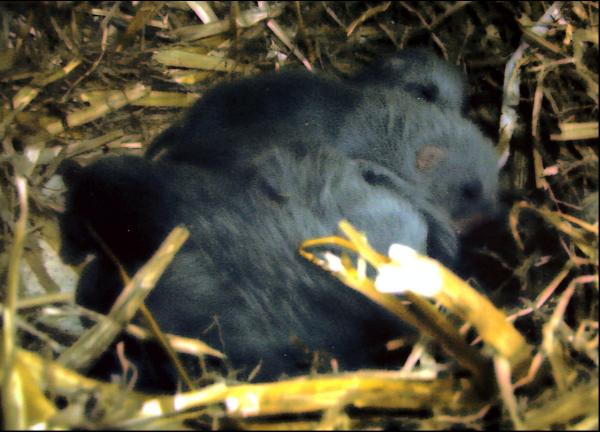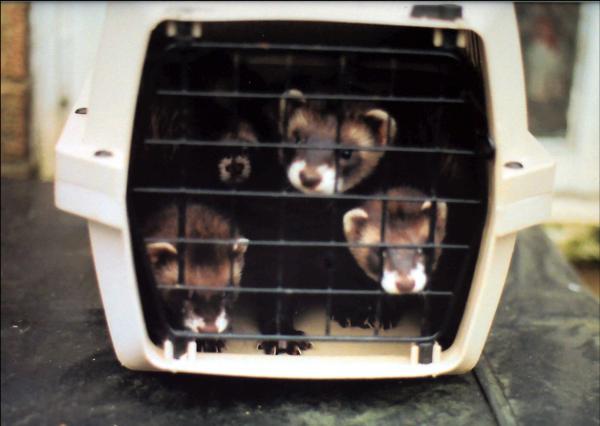Fostering Kits Parts 1 & 2
by Sue Lloyd
Part One
To do or not to do, this was the dilemma facing my friend Lillian when she discovered that her polecat hybrid jill, Millie, would be unable to feed the litter she was expecting.
The previous year Millie had given birth to seven kits all of which soon died. As Millie was full of milk it was assumed that she had mastitis and was treated accordingly. All seemed fine so whe was put with another hob the following year. Unfortunately her middle expanded to such a degree that she was taken to the vets, who discovered that she seemed to be suffering from a rare syndrome of inverted nipples and was therefore unable to express milk.
Lillian was devastated. What was she to do? Never one to give up Lillian prepared to hand rear the babies. "You're nuts!" I exclaimed. So with Lillian's consent I set about trying to find a foster jill.
I started phoning friends who bred with no joy. Once upon a time the local radio station would happily help by broadcasting an appeal but not any more. Time was getting short with kits due in less than a week, so I contacted my local evening paper, the Evening Gazette who thankfully were happy to help. Ron Livingstone wrote out an SOS and, oh yes, DID my phone ring! After sorting out the jokes from the serious enquiries I had two possibilities both with small litters. Bingo!!
The jills and their kits went to board with Lillian and were nicely settled in when Millie gave birth to 10. Lillian splits the kits up evently giving 5 each to the other two nursing jills who happily accepted the necomers. Unfortunately, 3 of the kits died so the remaining 2 were put with the other jill who successfully raised them all.
Why did these 3 kits die? I really don't know. Perhaps it was because the kits of one of the foster jills were older and her teats became too large for the newly born kits to feed, although they did survive for several days. Who knows? Once Millie's milk had dried up (she produced but couldn't express it) she joined the happy family and helped to rear all the kits. Millie had been devastated when her kits had been taken away from her but now she was reunited and happy. Mind you so was Lillian! Hand rearing 10 kits would have been an exhausting and emotionally draining nightmare.

It is presumed that the babies never received any colostrum, that first, special milk that contains antibodies to fight disease. However, the 4 jills and 3 hobs thrived and with good feeding and lots of love and care have grown into large, strong, energetic kits that win virtually every time they're shown!
Special thanks to the foster jills and their owners.

Part Two
This is not the first time that I have had to find a foster jill so in September's newsletter I mentioned that I would start a Foster Jill Register.
If you have a jill who has a small litter would you be prepared to place her on the register? If your jill loses her litter (sad as this is) she may well accept another jill's litter. Although her milk would dry up within a matter of days it is still well worth placing her on the register as you never know if a foster jill is needed that day or the next. Most jills will foster but those that are highly strung or nervous have in the past eaten their litters so do not make good fosterers.
It doesn't matter where you live as owners are often happy to travel.
If you have orphan kits do please phone to see if a foster jill is available.
Foster jills remain the 'property' of their owner: you would only be borrowing her and her kits if she comes with any. It is expected that when she is on loan to help raise orphan kits that she will be properly looked after and that should any vet bills arise that these will be met by the orphaned kits owner.
If possible it is better if the orphaned kits can be kept warm and taken to the foster jill's home to cause as little disturbance to the jill as possible
Either way, try to tempt the jill out of her nest with a treat, place the kits in the nest and try and put the jill's or that of her own kits scent onto the orphans to aid acceptance.
Please note that the orphaned kits remain in their breeder's ownership.
To register please phone or text your details to Sue Lloyd 07817 415645
